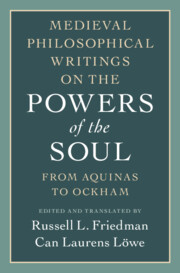Book contents
- Frontmatter
- Contents
- Acknowledgments
- Sources of the Translated Texts
- Notes on the Translations
- List of Abbreviations, Symbols, and Conventions
- Introduction:
- 1. Bonaventure (d. 1274), Commentary on the Sentences, book II, d. 24, a. 2, q. 1:
- 2. Albert the Great (d. 1280), Summa theologiae, book I, treatise 3, q. 15, chap. 2, a. 2, c. 1:
- 3. Thomas Aquinas (d. 1274), Commentary on the Sentences, book I, d. 3, q. 4, a. 2:
- 4. Henry of Ghent (d. 1293), Quodlibet III, q. 14 (excerpts):
- 5. Godfrey of Fontaines (d. ca. 1306), Quodlibet II, q. 4:
- 6. Thomas of Sutton (d. ca. 1315), Ordinary Question 4 (excerpts):
- 7. Peter of John Olivi (d. 1298), Questions on the Sentences, book II, q. 54 (excerpts):
- 8. John Duns Scotus (d. 1308), Commentary on the Sentences (Reportatio A), book II, d. 16:
- 9. James of Viterbo (d. 1308), Quodlibet I, q. 7, doubt 1:
- 10. Durand of St.-Pourçain (d. 1334), Commentary on the Sentences (Third Version), book I, d. 3, part 2, q. 2:
- 11. William Ockham (d. 1347), Commentary on the Sentences (Reportatio), book II, q. 20
- Glossary of Terms
- Glossary of Arguments
- Bibliography
- Index
10. - Durand of St.-Pourçain (d. 1334), Commentary on the Sentences (Third Version), book I, d. 3, part 2, q. 2:
Are the Soul’s Powers the Same as Its Essence?
Published online by Cambridge University Press: 10 April 2025
- Frontmatter
- Contents
- Acknowledgments
- Sources of the Translated Texts
- Notes on the Translations
- List of Abbreviations, Symbols, and Conventions
- Introduction:
- 1. Bonaventure (d. 1274), Commentary on the Sentences, book II, d. 24, a. 2, q. 1:
- 2. Albert the Great (d. 1280), Summa theologiae, book I, treatise 3, q. 15, chap. 2, a. 2, c. 1:
- 3. Thomas Aquinas (d. 1274), Commentary on the Sentences, book I, d. 3, q. 4, a. 2:
- 4. Henry of Ghent (d. 1293), Quodlibet III, q. 14 (excerpts):
- 5. Godfrey of Fontaines (d. ca. 1306), Quodlibet II, q. 4:
- 6. Thomas of Sutton (d. ca. 1315), Ordinary Question 4 (excerpts):
- 7. Peter of John Olivi (d. 1298), Questions on the Sentences, book II, q. 54 (excerpts):
- 8. John Duns Scotus (d. 1308), Commentary on the Sentences (Reportatio A), book II, d. 16:
- 9. James of Viterbo (d. 1308), Quodlibet I, q. 7, doubt 1:
- 10. Durand of St.-Pourçain (d. 1334), Commentary on the Sentences (Third Version), book I, d. 3, part 2, q. 2:
- 11. William Ockham (d. 1347), Commentary on the Sentences (Reportatio), book II, q. 20
- Glossary of Terms
- Glossary of Arguments
- Bibliography
- Index
Summary
In this text, Durand rejects a common assumption undergirding much of the Latin medieval debate about the relation between the soul and its powers. According to this assumption, which we can call the uniformity assumption, all powers of the soul that bring forth vital operations, such as the intellect and sight, bear the same relation to the soul. Identity theorists maintained that all of these powers are identical to the soul, while distinction theorists held that all of these powers are distinct from the soul. Against this consensus, Durand argues that some powers of the soul are identical to the soul, while others are distinct from it. More precisely, he advocates an identity theory with respect to the vegetative powers but a distinction theory with regard to the sensory and rational powers. He motivates his identity view regarding the vegetative powers with the argument that these powers have substances as their effects and the premise that causes must be like their effects. To motivate his distinction theory regarding the sensory and rational powers, Durand does not draw on Aquinas’ Category Argument, which he thinks is unsound.
Keywords
- Type
- Chapter
- Information
- Medieval Philosophical Writings on the Powers of the SoulFrom Aquinas to Ockham, pp. 188 - 209Publisher: Cambridge University PressPrint publication year: 2025

